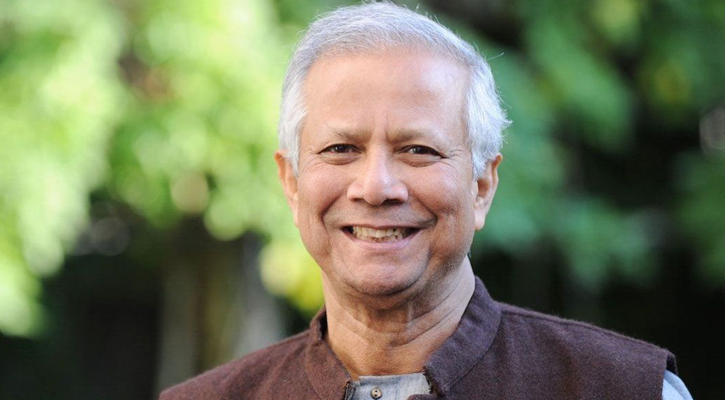At this moment, he is one of the most influential personalities in the world. He has dedicated his life to solving global crises.
This man, devoted to the welfare of humanity, is a true ambassador of world peace. He is an extraordinary individual, yet his life remains remarkably simple. Currently, he is recognized as one of the most intellectual and peace-loving figures in the world. Despite this, he always maintains his composure, living a restrained and moderate life. A tireless man, his face is always adorned with a smile. He is the beacon of hope for the world. At this moment, he is among the few individuals the world looks to for change. Yet, he remains humble. This person is not just a pride for Bangladesh but for the entire world. He is none other than Bangladesh’s Chief Advisor and Nobel Peace Prize-winning economist, Dr. Muhammad Yunus.
At a time when the world is grappling with violence, conflict, poverty, unemployment, and climate change, he shines as a guiding light. He is a torchbearer for the world. It is an incredible fortune for Bangladesh that this globally revered personality, this guiding force, has now taken the helm of the nation. On August 5, the Sheikh Hasina government was ousted through a public uprising. Following this, Dr. Muhammad Yunus was appointed as the Chief Advisor, embodying the collective aspirations of students and the masses. On August 8, in a crisis-ridden and fragile situation, he took charge of Bangladesh. For the past six months, he has been swimming against the tide, striving relentlessly to rebuild a shattered nation. The entire world stands with him. Over the past six months, he has elevated Bangladesh to a place of immense global respect. The influential magazine The Economist has declared Bangladesh the “Country of the Year” solely because of him.
Among the visionaries aiming to change the world, Dr. Yunus stands out. He won the Nobel Peace Prize for his groundbreaking work. His “Three Zero” theory—aiming for zero poverty, zero unemployment, and zero net carbon emissions—is now a widely discussed model for a safer and more sustainable world. This has become an effective global peace model. He has revolutionized women’s empowerment, harnessed youth potential, eradicated poverty, created employment, and pioneered social business and microfinance initiatives. He is also a leading voice in combating global climate risks. His concept of social business has gained recognition and popularity worldwide. The idea is now considered a viable solution for tackling the global economic crisis, and social business initiatives have expanded to various countries. The fact that such a remarkable individual is now leading Bangladesh’s governance is a monumental stroke of fortune.
Dr. Muhammad Yunus’ life is one of perseverance and knowledge. He is not just a scholar but someone who has implemented his research and discoveries in real life. He has spent his entire life researching, exploring, and innovating—applying his ideas to transform people’s lives. He has dedicated himself to improving the fate of the hardworking and marginalized. Now, Bangladesh is benefiting from his expertise. Just as he has been a guiding light for the world’s poor, he is also the “lighthouse” for Bangladesh.
If we analyze his extraordinary life, we see that this brilliant, dedicated man has always been driven by the urge to uplift humanity. His entire upbringing and career choices have been shaped by the desire to improve people’s lives. During the 1971 Liberation War, even while pursuing higher studies in the United States, he made significant contributions to the war effort. After the war, he returned to Bangladesh, forsaking a comfortable life to work in rural areas, seeking ways to improve the fate of the poor. His journey began in the remote village of Jobra, where he pioneered microcredit programs.
He faced numerous obstacles, including persecution and criticism, but his unwavering determination and integrity kept him on course. He built Grameen Bank from the ground up. Eventually, this bank transformed the lives of millions of impoverished people in rural Bangladesh. Those who once had no dreams and struggled to afford even two meals a day became self-sufficient through his initiatives. Small businesses flourished, and their children gained access to education.
Grameen Bank is not just a microcredit institution; it is an extraordinary movement for social change and peace.
We all know that poverty knows no country or language. That is why Dr. Muhammad Yunus spread the Grameen Bank model worldwide. From Arkansas in the United States to Africa, Japan, Europe, and even India, microfinance initiatives have flourished. Grameen Bank has become a benchmark for poverty eradication globally. Because of microfinance, millions of marginalized people have been lifted out of poverty. Without it, the world might have faced countless famines.
This is why Dr. Muhammad Yunus was awarded the Nobel Peace Prize in 2006. He was the first Bangladeshi to receive this honor. But even before that, he had already earned global recognition as a transformative figure. In 1984, he was awarded the prestigious Ramon Magsaysay Award—Asia’s equivalent of the Nobel Prize—for his work in empowering rural women through microcredit.
It is worth noting that Grameen Bank primarily serves marginalized women, granting them ownership and enabling their participation in economic activities. This has significantly contributed to women’s empowerment and has quietly sparked a revolution in Bangladesh. Grameen Bank is a pioneer in women’s empowerment in the country.
In 1987, the Bangladesh government awarded him the Independence Award in recognition of his contributions. But in a shameful turn of events, political conspiracies later led to his humiliation and unjust persecution. He was even subjected to legal battles and defamation campaigns.
However, the world has always recognized his contributions in various ways. He has been hailed as a Nation Builder for his strong leadership in rebuilding Bangladesh after the people’s uprising. Following his assumption of office, he was honored with this title by the renowned scientific journal Nature on December 7. He was ranked 7th on Nature’s list of the world’s top 10 influential figures in 2024.
Additionally, Dr. Yunus has been recognized among the world’s most influential Muslims. The Muslim 500: The World’s 500 Most Influential Muslims ranked him 50th.
Dr. Yunus’ work revolves around human welfare, and his contributions span across various fields. He is a trailblazer in women’s empowerment and youth leadership. He has worked tirelessly for women’s rights across the world and has always championed the potential of youth as a driving force for change.
Recognizing his impact in the field of sports, he was honored with the World Football Summit Lifetime Achievement Award in 2023. In 2021, he received the Olympic Laurel Award for his contributions to education, culture, development, and peace.
His accolades are numerous. In 2009, he received the Presidential Medal of Freedom from the United States—the highest civilian honor in the country. This was a historic moment, as the U.S. had once opposed Bangladesh’s independence and labeled it a “bottomless basket.” Yet, years later, it recognized a Bangladeshi with its highest honor.
Dr. Muhammad Yunus has always been a visionary innovator. Where others see limitations, he sees possibilities. That is why he has received unparalleled global recognition. These honors have fueled his determination to implement new ideas.
Very few individuals in history have been able to change the world through the practical application of their knowledge and research. Dr. Muhammad Yunus is one such individual. Bangladesh is exceptionally fortunate to have him as its leader in shaping the future. Under his guidance, Bangladesh is poised to secure a distinguished position on the global stage.

